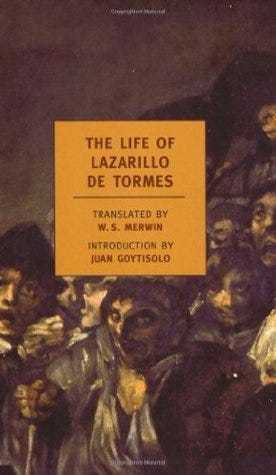The Life of Lazarillo de Tormes Review
The Life of Lazarillo de Tormes is a mid-16th century Spanish novella written by… nobody knows! And it’s about the title character narrating his rather rough yet sorta comedic early life as the downtrodden servant to a series of scumbag masters: a blind man who pretends to be a holy man, a priest who is even more stingy and cruel than the blind man, a sham nobleman who’s as poor as Lazaro, and another conman who sells papal indulgences.
For a book nearly 500 years old, it reads surprisingly well. Maybe that’s due to the more recent translation by Michael Alpert but the story isn’t bad either. There’s something entertaining about seeing Lazaro stumble from one horrible situation to another even if the characters are familiar archetypes and the chatty, light narrative voice definitely helps.
I enjoyed the tricks Lazaro employs to eat more than the crumbs he’s given by the priest and the pathetic way the fake nobleman behaved. The man selling papal indulgences though was pretty boring and the skewed way in which the anonymous author presented his story - how nearly everyone is a con artist to a certain degree - was a tad repetitive, overly cynical and probably wasn’t an original perspective even back then.
It is worth noting though that nearly all of those con artist characters are religious figures. Martin Luther’s grievances criticising the church had appeared only a few decades before so this kind of story was almost certainly influenced by this new way of thinking about the religious institutions that governed the world back then. And possibly explains why the author was anonymous - so that they wouldn’t face punitive repercussions for mocking a significant power structure of the age.
While crooked religious characters were probably more fresh in fiction back then, they’re something of a cliche at this point and didn’t impress me much. Still, Lazaro’s chipper outlook on life and lively narration made this an unexpectedly readable story and I found myself rooting for the lil scamp to catch a break.
The Life of Lazarillo de Tormes is still in print nearly half a millenia after it first appeared and I can see why. So if you want to read a relatively unknown, yet evidently enduring, classic that’s inspired the likes of Cervantes, or, like me, you want to tick the imaginary box that says you’ve read a book by “Anonymous”, this accessible and quaint picaresque novella might be for you.


